- Home
- Hammond Innes
The Doomed Oasis Page 2
The Doomed Oasis Read online
Page 2
‘You’d better get control of yourself,’ I said. ‘You’ve done enough damage for one day without threatening more and frightening your mother.’
But now the pressure inside him couldn’t contain itself any more. ‘You get out of here.’ He said it quietly and because of that his words had force. ‘What’s happened here is nothing to do with you or anyone else. It’s between my mother and me.’ He spoke through clenched teeth as though he were still trying to keep some control over what he was saying. And then suddenly he lashed out wildly, all control gone: ‘When you’re suddenly told you’re illegitimate, and your sister’s illegitimate, too, you want to know a little more about it, don’t you? You want to talk it over with your mother - ask her a few questions, find out who and what the hell you really are.’
He flung out an arm, pointing dramatically at the album on the floor. ‘See that? Uncle Charles’s scrap book. She subscribed to a press-cutting agency. Every story the newspapers published about him - it’s all there, pasted in with loving care. My own mother clinging to the worn-out bed of an old love. Jesus Christ! It makes you want to weep. And me and Sue coming up the wrong side of the bloody blanket, and being fooled into calling that poor drunken sot Dada.’ He stared at me balefully. ‘Eight years old I was when I first stole a peek at the contents of that book. A relation, that’s what she said, an uncle of mine. Started me getting interested in Arabia, it did. I thought he was a bloody hero. Instead, he’s just a low-down, dirty heel who left my mother flat. Well, what do you say to that, eh? You’re a lawyer. Maybe you can tell me what I ought to do about it?’ And he glared at me as though I were in some way responsible.
And then he suddenly moved, a quick step forward that brought him face-to-face with me. ‘Now you just get the hell out of here and let me talk to my mother alone, see.’ His eyes had a wild look, the sort of look I’d only seen once before on a boy’s face, but that had been in the midst of battle.
I’d known how to deal with it then. But this kid was different. It wasn’t only that he looked tough; I had a feeling he was tough. Well, I’m not exactly soft, but I don’t walk into things with my eyes open. But then I glanced at Mrs Thomas, saw how scared she was of him, and after that there was nothing for it but to stand my ground, not knowing what exactly he’d do, for I could feel the tension building up inside of him again. He was like a spring coiled too tight.
And then the ring of the ambulance bell sounded down the street and the violence suddenly died out of him. It drew up outside the house and a moment later two hospital attendants came in with a stretcher.
The attention of the three of us was focused then on the man on the couch. He murmured as they shifted him, an inarticulate sound, and Mrs Thomas, fussing over him now, spoke his name. The tone of her voice had a quality that is only possible between people who have shared their lives together, and it seemed to reach him, for his eyes flicked briefly open and he murmured her name. ‘Sarah.’ It came thickly from his twisted lips, obscured by the effort of moving half-paralysed muscles. ‘Sarah - I’m sorry.’ That was all. The eyes closed, the face became clay again, and they took him out.
Mrs Thomas followed them, sobbing uncontrollably. The door swung to of its own accord and the room was still. ‘I shouldn’t have hit him. It wasn’t his fault.’ The boy had turned away and his shoulders were moving. I realized suddenly that he was crying. ‘Oh God!’ he sobbed. ‘I should have known. If I’d had any sense, I should have known.’
“You couldn’t have known he’d have a stroke,’ I told him.
He turned on me then. ‘You don’t understand.’ The tears were standing in his eyes. ‘He and I - we hated each other’s guts. I can see why now. But at least he stood by us, poor sod.’ And he added viciously, ‘He was a damn’ sight better than my real father. If I can ever lay my hands on that bastard—’ He checked there and gave an odd little laugh. ‘Bastard! That’s funny, isn’t it, me calling him a bastard.’ He turned away then, brushing the back of his hand across his eyes. ‘I wish I hadn’t hit him,’ he said quietly.
‘He’ll be all right.’
‘You think so?’ But then he shook his head. ‘No, he’s going to die. That’s what the doctor said. He was the only father Sue and I ever knew,’ he added, ‘and now I’ve killed him.’
‘Don’t talk nonsense. It’s not as dramatic as that. He’s had a stroke - and anyway you’re entitled to defend your mother when a man hits her.’
He looked at me. ‘Did she say that?’ And then he laughed, a little wildly. And after a moment he said, ‘Yes, that’s right - he hit her.’ And he added, ‘Christ! What a bloody mess!’ The door of the ambulance banged in the street outside and he turned to stare out of the window. The engine started and it drove off. As though its departure had started an entirely new train of thought, he swung round on me. ‘You’re Whitaker’s lawyer, aren’t you?’
The name meant nothing to me, but then no doubt Mrs Thomas’s allowance had been arranged by Evans years ago and it would be handled by my clerk as a matter of routine. ‘Whitaker is the name of your father, is it - your natural father?’
‘That’s right. My natural father.’ He spoke the word slowly, savouring it for the first time. And then he said, ‘I want his address.’
‘Why?’
‘Why the hell do you think?’ He was back at the window again. ‘A bloke’s got a right to know where his father lives, hasn’t he?’
‘Maybe,’ I said. ‘But I’m afraid I don’t know his address.’
‘That’s a lie.’ He came back to me, his eyes searching my face. ‘Well, you’ve got it on your files, haven’t you? You could look it up.’
‘If he’s a client of mine, then I’m not at liberty to disclose—’
‘Not even to his son?’
‘No, not even to his son.’ I hesitated. The boy’s temper would cool and after all he’d a right to know where his father was. ‘If I’ve got his address,’ I said, ‘then I’ll write to him if you like and get his permission—’
‘Oh, don’t give me that crap. You know bloody well where he is.’ He caught hold of my arm. ‘Come on. Arabia, it is - somewhere in Arabia. Tell me, for Christ’s sake.’ He saw it was no good then and began to plead: ‘Please, I haven’t much time and I got to know. Do you hear? I got to know.’ There was a desperate urgency in his voice. And then the grip on my arm tightened. ‘Let’s have it.’ I thought he was going to hit out at me and my muscles tensed, ready for him.
‘Dafydd!’
Mrs Thomas was standing in the doorway, her hands plucking again at the apron. ‘I can’t stand any more.’ There was an edge to her voice that seemed to get through to him and he relaxed slowly and stepped back from me. ‘I’ll come for that address,’ he muttered. ‘Sooner or later I’ll come to your office and get it out of you.’ He was back at the window again, looking out. ‘I’d like to talk to my mother now.’ He stared at me, waiting for me to go.
I hesitated, glancing at Mrs Thomas. She was still as stone, and her eyes, as they stared at her son, were wide and scared-looking. I heard the slow intake of her breath. ‘I’ll go and make some tea,’ she said slowly, and I knew she wanted to escape into her kitchen. ‘You’d like a cup of tea, wouldn’t you now, Mr Grant?’
But before I could reply and give her the excuse she needed, her son had crossed over to her. ‘Please, Ma.’ His voice was urgent. There isn’t much time, you see, and I got to talk to you.’ He was pleading with her - a small boy now pleading with his mother, and I saw her weaken at once. I got my hat from the roll-top desk where I’d left it. ‘It’s all right, Mrs Thomas,’ I said. ‘I’ll leave you now.‘There was a phone on the desk, an old-fashioned hook-up instrument standing amongst a litter of books on greyhounds and racing form. ‘You can always phone my office if you want me.’
She nodded dumbly. She was trembling slightly and I could see she was dreading the moment when she’d be left alone with him. But there was no point in my staying. This was something that la
y between the two of them, alone. ‘Take my advice,’ I told him. ‘When the police arrive, be a little more co-operative with them than you have been with me if you want to avoid trouble. And stick to your mother’s story.’
He didn’t say anything. The sullen look was back in his face. Mrs Thomas showed me to the door. ‘I’m sorry,’ she said. ‘He’s upset.’
‘It’s not unnatural.’ I was remembering how I’d felt when I learned that my parents were divorced. I’d heard it first from a boy at school and I’d called him a liar and half murdered the little swine. And then when I discovered it was true, I’d wanted to kill my father and had had to content myself with a letter, which for sheer brutality had been inexcusable. ‘It’s a pity you didn’t tell him before.’
‘I always meant to,’ she said. ‘But somehow—’ She shrugged, a gesture of hopelessness, and as I went out to my car I was wishing I could have done more to help her.
As I turned out of Everdale Road a squad car passed me. There were four of them in it, including Sergeant Mathieson of the Cardiff CID. It seemed an unnecessarily large force to answer Dr Harvey’s call, but I didn’t go back. It was past five already and Andrews would be waiting to clear the day’s business.
Andrews was my clerk. He was also secretary, switchboard operator, office boy. Poor devil, he had come to me with the furniture and the two-roomed, dingy office, all that remained of my uncle’s once-prosperous business, which he had left to me in a fit of misplaced optimism, for though I’d passed my law exams, I’d never practised. There’d been the war and then I had drifted to Tanganyika and tea-planting, a venture which had turned out badly, leaving me virtually broke at the time of his death, so that the legacy of that miserable place seemed like the smile of fortune.
‘Know anything about a Mrs Thomas?’ I asked Andrews as he helped me off with my coat. He had drawn the curtains and with the coal fire burning brightly in the grate, the place looked almost snug, despite the dust and the piles of documents and the black deed boxes littering the floor by the open strong room door. ‘It’s a matter of a small allowance she claims we handle for her.’
‘Mrs Thomas is it?’ I had seated myself at the desk and he stood over me, tall and slightly stooped, the skin stretched taut as vellum across the bones of his long face. ‘You know, Mr Grant, almost half our clients are named Thomas.’ It was part of the game that he must always make the simplest thing appear difficult.
‘It’s one of your old clients,’ I said. ‘Something I have apparently quite unwittingly inherited from the old man.’
‘From Mister Evans, you mean.’ That, too, was part of the game, and because his position was privileged I had to humour him. ‘All right, Andrews. From old Mr Evans.’ The firelight flickered on the lined, hang-dog face bent obsequiously over me. He’d been with my uncle since before he was articled and had stayed with him right through his long illness until he had died two years ago. God knows how old he was; his scrawny neck, covered by a hard stubble, stuck up out of the soiled stiff collar like the flesh of a plucked fowl. ‘Well, what about it?’ I said impatiently. ‘I inherited so little in the way of business that it rather narrows the field. Does the name Whitaker ring a bell?’
‘Whitaker?’ His Adam’s apple moved convulsively. ‘Ah yes, of course. Colonel Whitaker. A little matter of a settlement. It used to come to us quarterly from Bahrain in the form of a banker’s draft, which we cashed and forwarded to an address in Grangetown.’
I asked him to get the file. But of course there wasn’t any file. However, whilst I was signing the letters, he managed to dig up some record of the arrangement. It was written on the firm’s notepaper in my uncle’s sloped writing and went back to before the war. In it Charles Stanley Whitaker undertook to pay to Sarah Davies the sum of twenty-five pounds quarterly for a period of fifteen years, or in the event of his death, a lump sum from the estate equivalent to the balance ALWAYS providing that such sum … The clue to what it was all about was contained in the final paragraph, which read: THIS settlement to be binding on my heirs and assigns and to be accepted by the said Sarah Davies in full settlement of any claims real or imagined. The signature at the bottom was a barely decipherable scrawl, and below it Sarah Davies had signed her name in a clear, schoolgirl hand.
‘If you ask me, Mr Grant, the Colonel got this young lady into trouble.’
The dry snigger with which Andrews accompanied this appraisal of the situation annoyed me. The young lady, as you call her, is now an unhappy and rather frightened woman of middle age,’ I told him sharply. The son, according to this, is nineteen and he’s only just discovered that he’s illegitimate. There’s a twin sister, too. Not a very amusing situation.’ And Whitaker - was he still in Arabia, I wondered? ‘Do you think the man has any idea he’s a son and daughter here in Cardiff?’
‘I couldn’t say, sir.’
‘Have we got his address?’
The bank in Bahrain. That was the only address we ever had.’
And Bahrain was in the Persian Gulf. But it was over three years since the last payment had come through. He might be anywhere now - back in England, retired, probably. ‘A pity we haven’t got his address,’ I said. I was thinking that the son must take after his father: the beaky nose and strong jaw were both physical characteristics that didn’t suit his circumstances. This is all we’ve got on Whitaker, is it?’
Andrews nodded.
Then how the devil do you know he’s a colonel? There’s no mention of colonel in this settlement.’
Apparently Andrews had seen his rank given in some newspaper story. ‘Something to do with oil concessions, I think. There was a picture, too, with some sheikhs in flowing robes and Colonel Whitaker in the centre dressed in khaki shorts and a military cap.’
‘How did you know it was the same man?’
‘Well, I couldn’t be sure. But I don’t think there could be two of them out in that area.’
He was probably right there. ‘I’ll ask Captain Griffiths about him.’ A man who spent his life taking his ship in and out of Arabian ports should know, and he was due in the office at five-thirty., ‘Is the conveyance on that property of his ready now?’
Andrews produced it from the bottom of the pile, a bulky package that looked as though it contained enough deeds to cover a twenty thousand acre estate instead of a little cottage on the Gower Peninsula. There’s still a map to be inserted in the conveyance. Otherwise it’s all there, title deeds, searches, everything.’
I told him to get on to the man who was doing the map right away. ‘Griffiths wants all the documents before he sails tonight.’ The phone rang. It was Mrs Thomas and I knew by the tone of her voice that something had happened. They came just after you left and I’m so worried, Mr Grant, I don’t know what to do. And now Sue has got back and she said to ring you. I’m very sorry to trouble you when you were so kind and came out here all for nothing, but you did say to telephone you if I needed any help and so I thought perhaps—’
‘Just tell me what’s happened, Mrs Thomas,’ I said.
‘Well, you see, they’ve taken Dafydd away and—’ Her voice broke down then. ‘I’m so terribly worried about him, Mr Grant. I don’t know what’s going to happen. So determined he is, you see. Once he’s got an idea into his head … always been like that he has ever since he was little, you know. Nothing would ever make him change his mind once he had made it up.’
‘Never mind about what’s in your son’s mind. What happened when the police arrived?’
They just said he was to go with them.’
To the police station?’
‘I don’t know.’
‘For questioning, was it?’
They didn’t say. I asked them why they were arresting him, but they wouldn’t tell me. Been in trouble he has, you know, and them behaving as though—’
‘Did Sergeant Mathieson say he was arresting him?’
‘No, he didn’t say that exactly. He just said he was to come along with them. But i
t’s the same thing, Mr Grant, isn’t it?’
‘Did he charge him?’
‘No. No, I don’t think so. He just said he was to come along, and he went. He didn’t try to resist or anything. They just took him and now I don’t know what is going to happen to him.’
‘Mrs Thomas,’ I said. ‘There’s something I want to ask you. Can you tell me where Colonel Whitaker is now?’
The quick gasp of her breath and then a long pause. ‘No. No, I don’t know. But somewhere in Arabia it will be.’
‘He’s still alive then?’
‘Oh yes.’
‘You’ve heard from him?’
Again the pause. ‘No. No, I never heard from him. Never.’ And she added quickly. ‘Only the allowance. Very good he was about the allowance.’ She sighed. ‘Never a penny I took for myself, but spent it on Dafydd. Clever he is, you know - a quick brain and good with his hands. I thought perhaps he would become an engineer.’ Her quick tongue ran on, about the books she’d bought him and how she’d sent him to night school, and I let her talk because it seemed to help her. ‘He couldn’t understand it when the money ceased. It was then he began to run wild, you see; down in the docks all the time and his heart set on getting to Arabia. Speaks Arabic you know.’ She said it with pride, and in the same breath added, ‘I tried to discourage him, but it was no good. He had books, you see, and all those Arabs down in the Tiger Bay district. In the blood it is, I suppose - in the blood and in their stars. And that book of cuttings. I should never have let him see it.’ And then she added, ‘A pity you weren’t here when they came for him. I know it would never have happened if you’d been here.’
‘Well, don’t worry about it any more,’ I said. ‘I’ll phone them and find out what it’s all about. Have you heard how your husband is?’ But she’d received no word from the hospital. ‘Well, that’s good,’ I said. They’d have been in touch with you if they were worried about his condition. I’ll phone you if I’ve any news about your son.’ I put the phone down. ‘First thing tomorrow, Andrews,’ I said, ‘get on to the newspapers and see if they’ve anything on their files about Whitaker. What that boy needs right now is a father, the sort of father he can look up to.’

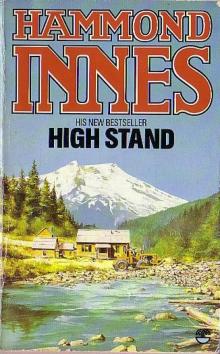 High Stand
High Stand The Doomed Oasis
The Doomed Oasis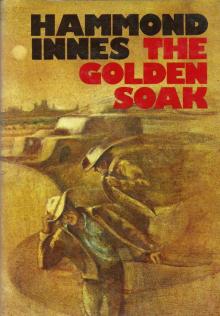 Golden Soak
Golden Soak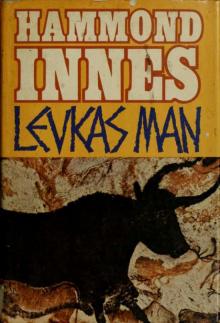 Levkas Man (Mystery)
Levkas Man (Mystery)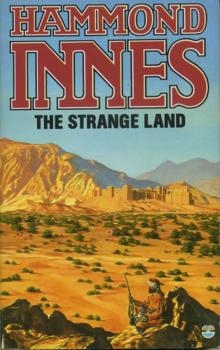 The Strange Land
The Strange Land Dead and Alive
Dead and Alive Attack Alarm
Attack Alarm The Strode Venturer
The Strode Venturer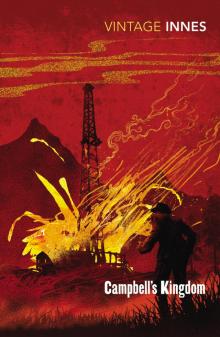 Campbell's Kingdom
Campbell's Kingdom North Star
North Star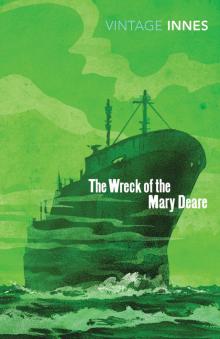 The Wreck of the Mary Deare
The Wreck of the Mary Deare The Lonely Skier
The Lonely Skier The Black Tide
The Black Tide The Trojan Horse
The Trojan Horse Medusa
Medusa Air Bridge
Air Bridge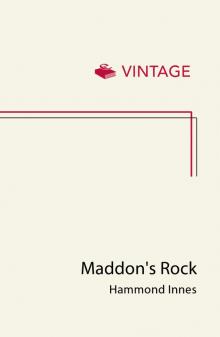 Maddon's Rock
Maddon's Rock The Angry Mountain
The Angry Mountain Wreckers Must Breathe
Wreckers Must Breathe Solomons Seal
Solomons Seal The White South
The White South